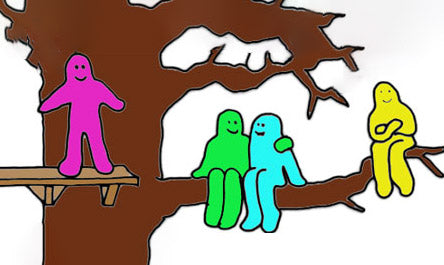Purpose
One of the primary reasons behind lack of motivation is regretting the past. When you are down, it is easy to question your past decisions and how they have let you down. Sounds kind of logical to look back and examine the past, right? May be somehow there is a clue there that would help. It is a tempting approach, except that this backward looking action can be quite damaging to current life.
This article offers insights on how to eliminate strong feelings created by regret, while exploring some significant findings over the past three decades. This is followed by a very effective exercise that consists of five primary actions helping to systematically manage the strong emotion of regret.
Examining regret is rather personal and this exercise is designed to be carried out in private. Hence, as a trainer, you don’t need to run this exercise in a group or during a course. To run as an exercise, do the following:
- First, brief the delegates about regret and how it can be handled. Let them know about the research presented here and lead them to question assumptions.
- Walk through the systematic 5-Action exercise and help delegates see what they need to do during each step. They can then complete the exercise in private to achieve best results.
This 5-Action exercise on regret is ideal for courses on emotional intelligence, motivating people, stress management, performance management and appraisal.
Why People Regret?
Life is about making conscious decisions all the time. Some of these decisions are good and sever you well while others turn out to be poor, leading to bad results.
The more you live, the more likely that you make poor decisions as the number of decisions you make accumulate—there is no avoiding this. Each poor decision made leads to a certain amount of regret. Inevitably, these regrets add up.
It is quite common that by middle-age people start to feel they could have done things differently and that what they have isn’t as good as what could have been.
Notice the word ‘could’ here; it is what drives this entire emotional reaction—and the clue to managing regret is to manage this ‘could’.
The problem with such negative mindset is that, if unchecked, can quickly lead to depression. You feel your life is not good enough, it is not as interesting as it could have been, or should have been, and so what’s the point of putting any more effort into it. It is a lost cause anyway, why bother anymore worrying about it! The thinking is that this life can never be rescued; it’s all downhill from here, and so on goes the destructive thoughts.
What Do People Regret the Most?
Let’s start our exploration by looking at the big picture first. What is it that people truly want in life? What would make them unhappy if they didn’t get it?
When confronted with such profound questions, it pays to ask wise old people; they have much to teach us having lived long on this planet.
Bronnie Ware, an Australian nurse and counsellor, was in charge of caring for the terminally ill, most of which had only 12 weeks to live. As part of providing counselling and therapy, she asked them about any regrets they had about their lives. What would they change if they had a second chance?
Analysing the results, she realised that there were five regrets that stood out the most (Ware 2012).
Looking back at life, people regret the most about:
- I wish I pursued my dreams and aspirations, and not the life others expected of me
- I wish I didn’t work so hard
- I wish I had the courage to express my feelings and speak my mind
- I wish I had stayed in touch with my friends
- I wish I had let myself be happier
Do People Regret Outcomes Out of Their Control?
Would you regret something that happened to you? Is regret result of action, inaction or a circumstance beyond a person’s control, such as having polio as a child?
Studies show that only 10% of people regret an outcome that was caused by something beyond their control (Gilovich & Medvec 1995). Most tend to regret things that are the direct result of their action or inaction.
Regret is mainly about actions or inactions.
But do we regret both these equally or is there a difference between the two?

People don’t tend to regret a natural disaster leading to significant change in their lives.
Do People Regret Actions or Inactions?
Thomas Gilovich, at Cornell University, has been studying regret for more than a decade. His studies are fascinating and shed light on how people regret (Gilovich & Medvec 1995).
In his experiments, Gilovich asked participants to look back at their lives and describe their biggest regret; that if they had an opportunity to live again, would they do something differently?
The results were fascinating.
About 75% of the participants reported that they regret not doing something. Example of inactions that people regret are:
- Not taking advantage of an important opportunity
- Not studying hard enough in school
- Not spending enough time with family and friends
In contrast, only 25% of participants regret doing something. Examples of these actions are:
- Making poor career decisions
- Marrying the wrong person
- Having a child at the wrong time in life
In another study the researchers directly asked participants the following question:
“When you look back on your experiences in life and think of those things that you regret, what would you say you regret more, those things that you did but wish you hadn’t, or those things that you didn’t do but wish you had?”
The results confirmed the above.
People tend to regret things they did not do more than those they did.
Is this always the case for any decisions made? As with most emotions, it is not always this straight forward. It is now going to get a little tricky with the following famous study.
What Can We Learn from Share Dealing Scenarios About Regret?
In a much-cited study carried out by Kahneman and Tversky (1982) on counterfactual thinking, the following scenario was presented:
“Mr. Paul owns shares in company A. During the past year he considered switching to stock in company B, but he decided against it. He now finds out that he would have been better off by $ 1,200 if he had switched to the stock of company B. Mr. George owned shares in company B. During the past year he switched to stock in company A. He now finds that he would have been better off by $1,200 if he had kept his stock in company B. Who feels greater regret?”
Take a moment and think who feels more regret; Paul who didn’t take an action to switch, or George who took the action and switched?
Amazingly, 92% of the respondents think that Mr. George, whose misfortune was the result of taking an action would experience more regret.
And it is easy to feel the same. It’s kind of obvious, right? It hurts to be in George’s position.
You may now think, but wait, didn’t the study on action/inaction by Gilovich & Medvec indicate that people regretted more about things they did not do. Here, it seems obvious, that George who took an action (to sell the share), certainly felt more regret. Is this a contradiction?
The Temporal Effect of Regret
This seemingly contradictory result is indeed what Gilovich & Medvec investigated about and they suggested that both conclusions are correct. They are manifestations of a temporal pattern of regret:
Actions tend to lead to more regret in the short run, while inactions tend to lead to more regret in the long run.
You decide to buy a house but immediately regret it as soon as you move in. You decide to sell a tech share which then skyrockets up to ten times of its original value.
All are actions in the short term, and you regret them.
At the same time, you regret not getting a university degree, not switching jobs, not working harder in your 20s or not spending enough time with your dying father. All of the above are long term inactions.

The Regret Contrast
It feels obvious why you may regret doing something when you just did it. You took an action, it went wrong, and you immediately regretted it. In contrast, you didn’t do something, the result wasn’t good and you are likely to say, “oh, well, better luck next time”, and move on hopefully.
The question is, why we regret things we didn’t do a while back. The answer is not as obvious as the short-term scenario.
Let’s explore this more.
It seems that when you regret something, it is easy to see the negative consequences of your decisions. You had a good job and you wanted a higher salary, so you switched jobs and the new job turned out to be a terrible environment to work in while your original company became ten times bigger; you then regretted switching jobs.
Or, you fell in love when you were 20 and had kids soon after, ending up baby-sitting for the rest of your 20s while your friends partied night after night.
Or, you got seduced and married the wrong person who you ended up arguing with over petty things most of the time.
In all cases, the consequences are known since you experienced them. These experiences are, however, limited. There is only so much you lost as a result of switching to a new job or having not partied with your friends.
When one door closes, another opens; but we often look so long and so regretfully upon the closed door that we do not see the one which has opened for us.
Alexander Graham Bell
In contrast, when it comes to regretting something you didn’t do a while ago, the situation is quite different. Here, there is no limit to the potential of what you could have achieved. It is only bound by your imagination, and because it was a while ago, your imagination can be pretty wild.
What if you had approached that exotic looking Japanese girl in university and asked her out for a date? Maybe she would have made you the happiest person on earth; you would have travelled to Japan and you could be living there right now! Your mind can run away with all the exciting possibilities and adventures you could have had.
Or maybe if you had accepted that business proposition, you could have established a franchise with hundreds of branches all over the continent by now, while living in some exotic tropical island, not knowing how to spend your money.
Here, with the power of your imagination you can visualise an ideal future so good that makes you desperately want to go back and change that dreadful decision.
We can call this the regret contrast; there is a tendency to focus more on what could have been and regret not getting it than regret what you actually got as a result of some poor decision.
Acceptance & Forgiveness
Now let’s look at this in two new ways. Through life we learn that acceptance is an important quality. Something bad happens and you accept its consequences. Acceptance helps you deal with earthquakes and tsunamis or even a simple accident that you couldn’t do much about even if it led to significant change.
To deal with such seemingly random situations, we exercise acceptance, because there is nothing else we can do to avoid them. There is no point to complain about mother nature and hence there is nothing to regret. May the goddess of Fortuna be kind to you.
On the other hand, regret requires a decision—action or inaction. If you have done something or didn’t, you regret it; if something happened to you, there is nothing to regret.
The second way to look at regret is through forgiveness. If someone does something that you don’t like, you are advised that it is best if you practice forgiveness rather than letting it spiral out of control, ending up consuming you. Suppose your friend said something you didn’t like, you can forgive her, heal your relationship and keep your friendship. Here, you look at the consequences of someone else’s actions and you exercise forgiveness on their actions; which helps both of you to move on.
So far so good, except that forgiveness doesn’t have to be limited to other people. You can apply forgiveness to yourself too. We are all incomplete, prone to error, imperfect, a bit scared and always in need of tender care. Self-forgiveness on poor decisions, therefore, leads to the same great benefits for both entities; in this case yourself and your past self.
Manging regret comes down to being kind to your past self, just as you exercise kindness towards others. Your past self may need this tender care more than your present self, because it can be judged much more harshly, especially for things your past self didn’t do.
This act of self-care helps you stay friends with your past self and move on with life while focusing on the present—for that’s all we have.
Consequences of Your Decisions Is Part of the Environment
Much of who you are is the result of the environment you have been brought up and lived in. Your decisions and the consequences of those decisions are just as much part of your environment as anything else.
Just like accepting natural disasters, you must accept these consequences too. These consequences resulted from decisions made by a former self that no longer exists. That person has grown into a much more experienced you and there is no point wasting time regretting or analysing the previous self’s decision-making abilities.
Yet, most people don’t see their actions as part of the environment. We accept storms, floods and earthquakes. We know bad people do some bad things. But somehow, we don’t forgive ourselves for some mistakes our less experienced younger self made a few years back.
We need to let go and love the past self just as we love the present self; this way our life could be so much more positive.
Life Is Only a Game
A great analogy is to think of life as an arcade game.
Your parents have given you a single coin; you can use it to play your favourite game once. This is called ‘the game of life’. You start the game enthusiastically. You want to cherish every moment of this game. You are totally focused. You are in the game. You won’t let anything distract you—not the noise, not the people around and not even your friends.
You have now reached Level 5 and are intensely focused to reach Level 6, just for the fun of it. You don’t have to reach level 6 in fact; you are only doing it for yourself, just for fun.
Would you suddenly stop and ponder what you could have done in Level 3, or that why-oh-why did you ever collect this object, or turned that way or jumped on that platform and went straight into the mouth of the monster! No, you won’t be thinking about anything like that, that is already in the past and inconsequential. The joy is in staying focused on what you are doing right now and playing well so you can get to Level 6, again just so that you can tell yourself that you did. That’s all that matters.
This is the same for life. What you have played so far is gone, who cares how you played; but you can play exceptionally well from this point onwards and use every skill you have acquired in the process, just for fun. Who knows how many levels you can reach?
All that matters are the joy of playing and what you want to get out of it.
Having gone through this lengthy exploration of regret, it is time to do an exercise:
The 5-Action Exercise to Manage Regret
Action 1: Don’t Look Back to Figure Out the Future
Looking back is much like looking through the rear-view mirror while driving in order to figure out where you want to go or where you could have gone. Just like driving, it will distract you from seeing where you are going which can have drastic consequences. Only look ahead to see where you want to go.
Sit down, visualise a compelling future, plan actions that get you there and drive through life while looking ahead.
Exercise:
- For a systematic step by step approach to goal setting and forward planning, go through our book Focused Determination. Complete the exercises and fill in the forms while contemplating your present life and your future.
Action 2: Remedy the Situation
If you regret not doing something, consider rescuing the situation. What actions can you take that help you resolve it. The aim is to stop thinking about it and bringing it to an end. You want to close this ‘open loop’ in your mind so it doesn’t bother you again.
Exercise:
- Identify anything you regret that there is still something you can do about. For example, if you regret not having talked to your friend for a long time, then you can find a way to contact him/her and have a chat. For this exercise, ignore anything you regret that is unchangeable—such as regretting not talking to a person before he/she passed away.
- Schedule tasks for anything you identified above and do them.
Action 3: Ring Fence It
Limit the imagined benefits of something you could have done, but you regret not having done it. Your aim is to limit the extent of benefits of what you could have had rather than leaving it boundless.
Exercise:
- Consider regretting something you haven’t done a while back. Example: “I should have…”
- Make a mental picture of a ring fence around what might have happened if you had gone ahead with it. Visualise the benefits inside this elaborate magical fence and that all benefits fit in this area. You could not have gained any more benefits outside this fence.
- Imagine the fence with as much detail as possible—think about its colour and shape. Add some electricity effect, may be some wires. The more vivid you imagine the fence, the better. Here, we are borrowing from classical techniques in NLP (Neuro Linguistic Programming).
- Practice recalling your customised image of the fence the moment you regret that a while back you did not take a particular action. Condition yourself so that the visualised fence pops up in your head automatically. It helps to stop you from going wild with your imagination on what could have been if you had taken the action. It helps bring you back to earth.
Action 4: Swap Positives and Negatives
Rather than thinking of the benefits of what might have been and the negative consequences of where you have ended up now, think of it the other way around. This swap technique is extremely powerful. Here is how it works:
Exercise:
- Consider a decision you made in the past that you regret.
- List three negative consequences if you had not made the choice that you regret.
- List three benefits of your current situation, now that you have taken that decision.
- Remember the pros and cons by heart and recall them every time you are susceptible to suffer from this regret.
Action 5: Carpe Diem
Seize the day. When opportunity presents itself, evaluate it and take actions. Don’t procrastinate over it. Make the call. Write the email. Sketch the diagram. Start the project. Research the idea. Do the task.
Exercise:
- Make a list of current opportunities in your life. There are always plenty of them around.
- Formulate actions you can take that help you seize these opportunities.
- Do it now. Plan and schedule. Commit. Stay present.
References
Gilovich, T., & Medvec, V. H. (1995) “The experience of regret: What, when, and why”, Psychological Review, 102(2), 379-395
Kahneman, D., & Tversky, A. (1982) “The psychology of preferences”, Scientific American, 246, 160-173.
Ware, B. (2012) “The Top Five Regrets of the Dying: A Life Transformed by the Dearly Departing”, Hay House Inc, ISBN-13: 978-1401940652
Comments
By Bénédicte @ Wednesday, March 13, 2019 4:25 PM
Thank you for your great website!
I receive your emails since few years now, you are so great and creative!
thank you for taking the time to help others with your strategies
Warm greetings
Benedicte Suzuki
By SADIQ @ Wednesday, April 1, 2020 12:10 PM
I need more free training stuff.Many thanks
By Ehsan Honary @ Thursday, July 23, 2020 6:11 PM
Thanks Benedicte, happy that the content has been useful. All the best.
Soft Skills Training Materials
Get downloadable training materials
Online Train the Trainer Course:
Core Skills
Learn How to Become the Best Trainer in Your Field
All Tags
Training Resources for You

Course Design Strategy
Available as paperback and ebook

Free Training Resources
Download a free comprehensive training package including training guidelines, soft skills training activities, assessment forms and useful training resources that you can use to enhance your courses.

Our Comprehensive Guide to Body Language

Train the Trainer Resources
Get Insights - Read Guides and Books - Attend Courses
Training Materials
Get downloadable training materials on: Management Training, Personal Development, Interpersonal Development, Human Resources, and Sales & Marketing














Leave a comment
All comments are moderated before being published.
This site is protected by hCaptcha and the hCaptcha Privacy Policy and Terms of Service apply.